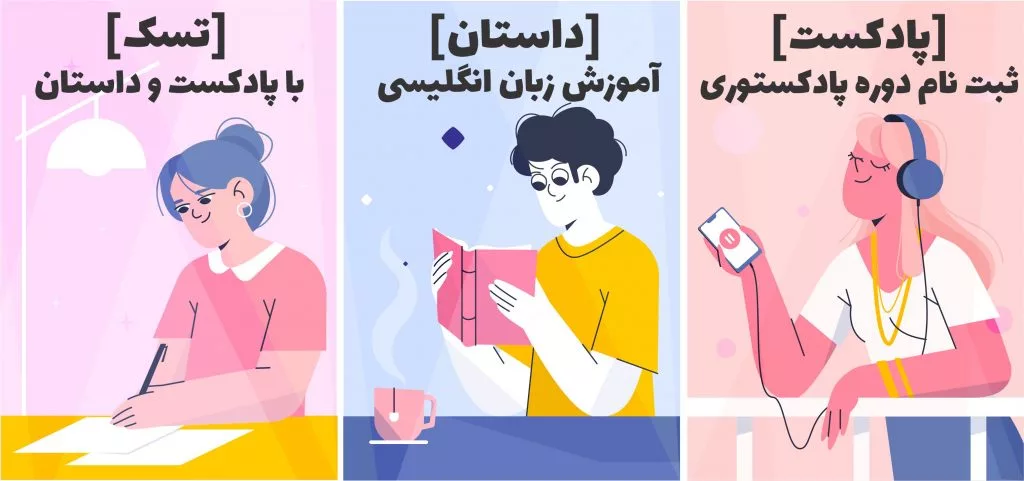پادکست انگلیسی BBC – تلفن هوشمند
در پادکست انگلیسی BBC – تلفن هوشمند درباره اعتیاد به تلفنهای هوشمند صحبت میشه. با دو اصطلاح در این باره آشنا میشویم و درباره این که چگونه با اعتیاد به موبایل و وابسته شدن به آن مقابله کنیم بحث خواهد شد. آیا شما هم جز افرادی هستید که هنگامی که موبایل در دستتان هست افراد واقعی دور و برتان را فراموش میکنید؟ آیا شما هم ترس از دست دادن موبایلتان را دارید؟
در پادکست انگلیسی BBC – آرزوها درباره سطل آرزوها یا آرزوهایی که همیشه منتظر فرصت برای رسیدن بهشان هستیم صحبت میکنه. این قسمت در این باره صحبت میشه که آیا اصلا آرزو داشتن و نوشتن آنها و اینکه لیستی از آرزوهایی که میخواهیم بهشان برسیم داشته باشیم چیز خوبیست؟ اصلا برنامه ریزی برای آرزوها خوب است؟
سوال پادکست انگلیسی BBC – تلفن هوشمند :
In what year did the term ‘smartphone’ first appear in print? Was it:
a) 1995
b) 2000
c) 2005
به پادکست خوب گوش کن تا جواب رو پیدا کنی.
اگر می خوای گوش دادن به پادکست تا حد امکان برات ساده و کارآمد باشه مراحل زیر را دنبال کن:
هر روز به پادکست گوش کن. وقتی براش یه وقت ثابت در روز در نظر بگیری برات تبدیل به عادت میشه و این عادت هرروز پیشرفت میکنه.
پادکستی رو پیدا کن که موضوعش برات جالب باشه. وقتی از خود موضوع لذت ببری یادگیری هم برات لذتبخش میشه.
به پادکستی گوش کن که transcript یا متن داره. این بهت کمک می کنه تا کلمات و عبارات جدید رو به سرعت در متن پیدا کنی و ساختار انواع مختلف جمله رو خوب یاد بگیری.
پس از گوش دادن به پادکست با متن، در مرحله بعدی سعی کن بدون نگاه کردن به متن این کار رو انجام بدی. این کار مهارت شنیداری رو تقویت می کنه و کمک می کنه تا انگلیسی زبانان بومی را راحت تر درک کنی، حتی اگر خیلی سریع صحبت کنن.
اگه به پادکست انگلیسی گوش کردی و نتونستی کامل متوجه اش بشی، ناامید نشو. پادکست هایESL -English as Second Language بیشماری وجود دارن که برای سطوح مختلف، از ابتدایی تا پیشرفته طراحی شدن. مطمئنا هر روز می تونین یه پادکست مناسب با سطح خودت پیدا کنی.
فراموش نکن که هرچی بیشتر تمرین کنی در اون مهارت رشد میکنی! به قول انگلیسی ها: Practice makes perfect
واژگان کلیدی پادکست انگلیسی BBC - تلفن هوشمند
| معنی به فارسی | معنی به انگلیسی | واژه |
| مخفف ترس از دست دادن | (acronym) Fear of Missing Out | FOMO |
| شخصی که افراد واقعی اطرافش را نادیده میگیرد چون روی گوشی موبایلش تمرکز کرده | person who ignores the real people around them because they are concentrating on their phones | phubber |
| معتاد به چیزی | having a physical or mental need to keep on doing something | addicted (to something) |
| قادر به متوقف کردن انجام دوباره کاری نیست | unable to stop doing something again and again | compulsively |
| در ارتباط بودن با | stay in contact with | keep in touch with |
| دیدار بصورت حضوری | actually meeting someone face-to-face | in person |
BBC 6 minute English -Smartphone addiction

برای دانلود پادکست روی سه نقطه سمت راست کلیک و گزینه Download را انتخاب کنید.
متن پادکست انگلیسی BBC - تلفن هوشمند
Rob
Hello, welcome to 6 Minute English. I'm Rob.
Catherine
And I'm Catherine.
Rob
So, Catherine, how long do you spend on your smartphone?
Catherine
My smartphone? Not that long really, only about 18 or 19 hours.
Rob
No, sorry, I meant in a day, not in a week.
Catherine
Er, that's what I meant too, Rob – a day.
Rob
Oh wow, so you’ve even got it right here…
Catherine
…yep, got it now, Rob. Yes, I should tell you that I suffer from FOMO.
Rob
FOMO?
Catherine
FOMO - Fear of Missing Out. Something cool or interesting might be happening somewhere, Rob, and I want to be sure I catch it, so I have to keep checking my phone, to make sure, you know, I don’t miss out on anything.
Rob
So we could call you a phubber… Hello… I said, so you’re a phubber? Someone who ignores other people because you’d rather look at your phone.
Catherine
Oh, yeah, that's right.
Rob
It sounds like you have a bit of a problem there, Catherine. But you’re not the only one. According to one recent survey, half of teenagers in the USA feel like they are addicted to their mobile phones. If you are addicted to something, you have a physical or mental need to keep on doing it. You can’t stop doing it. You often hear about people being addicted to drugs or alcohol, but you can be addicted to other things too, like mobile phones. So, Catherine, do you think you’re addicted to your phone? How long could you go without it? Catherine? Catherine!
Catherine
Sorry, Rob, yes, well I think if I went more than a minute, I'd probably get sort of sweaty palms and I think I'd start feeling a bit panicky.
Rob
Oh dear! Well, if I can distract you for a few minutes, can we look at this topic in more detail please? Let's start with a quiz question first though. In what year did the term ‘smartphone’ first appear in print? Was it:
a) 1995
b) 2000
c) 2005
What do you think?
Catherine
OK, you've got my full attention now, Rob, and I think it’s 2000, but actually can I just have a quick look on my phone to check the answer?
Rob
No, no, that would be cheating – for you – maybe not for the listeners.
Catherine
Spoilsport.
Rob
Right, Jean Twenge is a psychologist who has written about the damage she feels smartphones are doing to society. She has written that smartphones have probably led to an increase in mental health problems for teenagers. We’re going to hear from her now, speaking to the BBC. What does she say is one of the dangers of using our phones?
Jean Twenge, psychologist and author
I think everybody’s had that experience of reading their news feed too much, compulsively checking your phone if you’re waiting for a text or getting really into social media then kind of, looking up and realising that an hour has passed.
Rob
So what danger does she mention?
Catherine
Well, she said that we can get so involved in our phones that we don’t notice the time passing and when we finally look up, we realise that maybe an hour has gone. And I must say, I find that to be true for me, especially when I'm watching videos online. They pull you in with more and more videos and I’ve spent ages just getting lost in video after video.
Rob
Well that's not a problem if you're looking at our YouTube site, of course - there's lots to see there.
Catherine
Yes, BBC Learning English, no problem. You can watch as many as you like.
Rob
Well, she talks about checking our phones compulsively. If you do something compulsively you can’t really control it - it’s a feature of being addicted to something, you feel you have to do it again and again. Some tech companies, though, are now looking at building in timers to apps which will warn us when we have spent too long on them. Does Jean Twenge think this will be a good idea?
Jean Twenge, psychologist and author
It might mean that people look at social media less frequently and that they do what it really should be used for, which is to keep in touch with people but then put it away and go see some of those people in person or give them a phone call.
Rob
So, does she think it’s a good idea?
Catherine
Well, she doesn’t say so directly, but we can guess from her answer that she does, because she says these timers will make people spend more time in face-to-face interaction, which a lot of people think would be a good thing.
Rob
Yes, she said we should be using it for keeping in touch with people - which means contacting people, communicating with them and also encouraging us to do that communication in person. If you do something in person then you physically do it – you go somewhere yourself or see someone yourself, you don’t do it online or through your smartphone, which nicely brings us back to our quiz question. When was the term smartphone first used in print - 1995, 2000 or 2005? What did you say, Catherine?
Catherine
I think I said 2005, without looking it up on my phone, Rob!
Rob
That's good to know, but maybe looking at your phone would have helped because the answer was 1995. But well done to anybody who did know that.
Catherine
Or well done to anyone who looked it up on their phone and got the right answer.
Rob
Mmm, right, before logging off let’s review today’s vocabulary.
Catherine
OK, we had FOMO, an acronym that means 'Fear of Missing Out'. Something that I get quite a lot.
Rob
And that makes you also a phubber - people who ignore the real people around them because they are concentrating on their phones.
Catherine
Yes, I do think I’m probably addicted to my phone. I have a psychological and physical need to have it. My smartphone is my drug.
Rob
Wow, and you look at it compulsively. You can’t stop looking at it, you do it again and again, don't you?
Catherine
It's sadly true, Rob. To keep in touch with someone is to contact them and share your news regularly.
Rob
And if you do that yourself by actually meeting them, then you are doing it in person. And that brings us to the end of today’s programme. Don’t forget you can find us on the usual social media platforms – Facebook, Twitter, Instagram and YouTube - and on our website at bbclearningenglish.com. Bye for now.
Catherine
Bye!
امیدوارم از پادکست انگلیسی BBC - تلفن هوشمند لذت برده باشید.
گوش دادن به پادکست روش خوبی برای تقویت مهارت شنیداری و هم چنین یادگرفتن کلمات در بستر یک موضوع خاصه که این به تقویت مهارت مکالمه انگلیسی نیز کمک زیادی می کنه.
اگه تو هم از اون آدمهایی هستی که از گوش دادن به پادکست لذت می بره برات یه خبر خوب دارم! آموزشگاه زبان انگلیسی 24talk یه دوره طراحی کرده مبتنی بر پادکست و داستان کوتاه به اسم "پادکستوری - Podcastory". این دوره سعی کرده یادگیری زبان انگلیسی رو مناسب با نیاز و سطح زبان آموز به یه فرایند بسیار مفرح، موثر، سریع و کم هزینه تبدیل کنه.
همین الان می تونی با کلیک روی عکس زیر و ثبت نام در دوره ی آموزش زبان انگلیسی با پادکست و داستان ۲۴talk اولین و مهم ترین قدم رو برای یادگیری زبان انگلیسی برداری. وقت رو از دست نده!
دوره پادکستوری آکادمی مجازی 24talk
برای شنیدن دیگر پادکست ها، به بخش پادکست در مرکز آموزش رایگان مراجعه نمایید.









